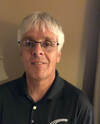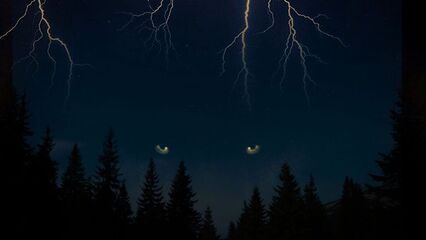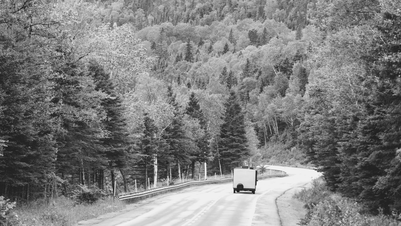|
I cradle Mother at my breast until the conductor comes to stamp my ticket. The man doesn’t seem to notice her trembling beneath my coat. “Where you headed, young lady?” “Blackwater Spring.” On the opposite bench, a grizzled older passenger wakes without opening his eyes, presents his ticket, then slumps back to sleep. When the conductor departs, I close the door behind him and unbutton my coat. Beside me, the raven spreads her wings and caws. “Be still, Mother,” I whisper. “We’re going to the black water. We’re going to make you well again.” I pull my suitcase down from the luggage compartment and retrieve the glass medicine bottle. “Just a thimble’s worth to dull the pain.” That was what the doctor said. The raven pecks violently as I try to hold her steady. I part the beak with one hand, and tip the silver thimble with another. Then the raven changes, and now a tawny bobcat is curled beside me. I stroke her spotted pelt and her ear twitches, and I listen to the rhythm of her laboured breaths. The steam engine roars, and the carriage rumbles; the train whistle blasts. I struggle to withhold my tears. I wake with a start in the dead of night, and the sickly bobcat is gone. Rising, I glance out the window. Beyond looms a skeletal wilderness of naked birch like some sprawling orchard of bones. All is dark and silent; the train isn’t moving. By the pale moonlight, I discover my grizzled fellow passenger isn’t moving either. His big lungs draw no breath. A trail of blue-black blood leads from his mangled throat out into the corridor. The tracks are like none I’ve ever seen. I knew Mother was ill the moment her teeth sank into my wrist. She had gone out in her wolf skin to hunt for our dinner. When she didn’t come home, I scoured the woods and found her whimpering, scratching her head against the bark of a tree. I ran to her side, and she lunged at me; I tumbled backward. Mother soon realized her mistake and hoisted me up in her strong human arms. “What have I done? My poor, sweet Matilda. What have I done?” My blood still streaked her mouth and chin. At the homestead, she bandaged my wound with ointment and herbs then retreated to our bed. There was no dinner, and Mother didn’t rise for three days. On the third, I crept once again into the surrounding woods and followed the path into town. I walked back with Dr Ellis under cover of night, lest any of the townspeople notice us. Dr Ellis wasn’t like other men in town—the godsmen who raised torches and cried “witch” or “devil woman.” I could see the way he looked at Mother, and I knew this was because he loved her. I’d read of such things in my books. Once, when I was little, the men with torches had come to our door, and Mother greeted them as a great brown bear. The godsmen scrambled away, screaming. Mother could still control her magic then and changed her skin at will, not at random (like she does now). Now, I can’t be certain what skin she will inhabit next. Raven. Bobcat. Monster… The lamps in the corridor have all gone dark as well. I poke my head out and listen to the darkness. Amid the susurrant snoring of sleeping passengers, I detect another, stranger, sound. A low, guttural growl. A claw tapping gently on glass. Mother is hungry, checking the locks. One door, several doors away, clicks and slides open. I pursue the sound with silent steps, parallel to the trail of blood. I grip the medicine bottle tight, prepared to wrestle Mother to the ground. My body quivers at the memory of her jaws clamping down on it. But I must be brave, lest anyone else be killed. Perhaps more than a thimble is needed this time. When Dr Ellis came out of the cottage that night, he found me sulking under the tall willow. (Many nights I dreamt the doctor would ask Mother to marry him and come to live with us at our homestead and be my Father.) He knelt beside me, and held my wounded hand. “I suspect your mama,” he said, “has a tumor in her brain. I’ve seen similar cases before. This tumor is making her very sick.” He said something else then about “X-rays” and a “radiologist on the coast,” but I’d become suddenly dizzy, disoriented. “Sometimes,” he continued, “sick people behave unlike themselves. But you must always remember: your mama loves you very much.” That was when he handed me the bottle, explained how to administer the medicine and how much and when. “Is Mother going to die?” He responded without saying a word. I sprang up and knocked his bottle to the ground. I told him I knew a place, Blackwater Spring, where the water healed the sick through magic—not with “X-rays.” Mother had said so when I was little. I told him I’d bring her there and make the tumor disappear. I pause at the open door of the sleeper car. Moist chewing sounds reverberate within. “Mother?” I hiss. A black silhouette rises up on its hind legs and turns toward me. My breath catches in my throat. I drop the medicine. I remember our last night at the homestead. It was also the last night I’d ever touch her human skin, gaze into her human eyes, and listened to the music of her human voice. Gazing now into these glowing noctambulant eyes, I recognize no trace of her at all. Mother has gone out into that skeletal wilderness, and I don’t give chase. As I stare up at the ceiling and the blood pools around my head, I reach out for the thimble and broken bottle of medicine. “Just a thimble’s worth,” I think aloud. “To dull the pain.”  Kirk Bueckert is a young writer living on the unceded territory of the Musqueam, Squamish, and Tsleil-Waututh Nations. His previous work has been published by Scarlet Leaf Publishing House and the League of Canadian Poets. He hopes you enjoy reading this new story as much as he has enjoyed writing it. “I still think you went the wrong way,” insisted Trudy. Dave glanced at the rear-view mirrors, ensuring that the camper he was towing didn’t go off the narrow pavement or clip one of the many limbs hanging over the path. “I turned where the sign pointed. It said to go this way for sites 38-66.” “It said sixty-five.” Trudy crossed her arms and leaned back in her seat. “Either way, we’re not turning around until we get to the end. It does seem like a long time since we passed the last campsite.” Trudy’s inevitable statement of “I told you so” was interrupted by the sound of the bottom of their camper scraping the road as they hit a deep dip. The screech sent a chill up Dave’s spine. He maneuvered the pick-up around another tight corner and exhaled at the sight of a clearing ahead. A small wooden post marked the spot as campsite sixty-six. “There. I knew I was right.” He pulled to a stop and climbed out to look at their home for the next three nights. “It’s a long walk to the bathroom and showers,” announced Trudy. Dave slapped at a mosquito buzzing near his ear. “I’m more worried about backing the camper in. It’s a tight fit. You’re going to have to direct me.” Trudy rolled her eyes. “You know I never can help you. You always get mad at me.” Dave didn’t reply. He swatted another bug and returned to the pick-up. Then, he pulled a short distance beyond the narrow driveway and rolled down the windows. Shifting into reverse, he cranked the steering wheel to the right and began backing up. Immediately the camper veered off in the wrong direction. Muttering to himself, Dave stopped and pulled forward slightly. He would have to start again. “That was the wrong way,” yelled Trudy. “I know that,” he screamed back. On the next attempt, the camper turned the correct direction but too sharply, heading directly for a large oak tree. “Watch out for that tree.” The next try found the pick-up nearly hitting the wooden post that displayed the campsite number. “What evil maniac put the post that close to where I have to back up,” thought Dave. The fourth effort seemed to go better. Dave stopped and waited for Trudy’s verification. Eventually, she yelled, “Why aren’t you moving? I’m waving you back.” “How am I supposed to know that. I can’t see you when you stand behind the camper.” “You don’t have to yell.” “Yes, I do. So do you. That’s the only way we will be able to hear each other.” With a deep breath, Dave began backing up once again. “Stop,” shouted Trudy, “you’re going to hit a stump on the left. You’ve got to pull forward and try again.” Fifty-two tries, forty-seven minutes, over one hundred silent swear words and at least half that many not-so-quiet curses later, the camper was finally in the campsite. It sat at an awkward angle and tilted heavily to one side. The pick-up sat nearly perpendicular to the camper, and its front half was nestled in the underbrush that surrounded the clearing. Dave hopped out of the cab and stepped into what appeared to be a patch of poison ivy. After going out of his way to avoid a large beehive hanging nearby, he began the long process of unhooking the camper. The tally of curses uttered continued to climb. Dave pulled a toolbox out of the back of the pick-up and set it on the ground. His knees cracked, and he felt a sharp pain in his back when he knelt to get the tools needed to steady the camper before unhitching it. The process would go much easier with Trudy’s help, but that ship had sailed a half-hour earlier when she had trudged off in anger. After what seemed like an eternity, Dave finally finished. He tossed the toolbox back into the pick-up, banging his knee against the hitch while he did so. There was only one job left to do. The annoying itching sensation around his ankles was becoming impossible to resist. He didn’t give in to the poison ivy, but he did scratch the mosquito bite on his cheek and the three welts on the back of his right hand. Smiling at the sarcasm, he pulled the “Happy Camper” flag from a storage bin, rubbed a knot out of his back, and went to hang the sign on the campsite marker. As he approached the wooden post, Dave was struck by a strange feeling that he had done all this before. It was more than deja vu. He’d been to this campsite before. He hung the banner and took a step back to look at it. “What the…” The flag no longer showed a marshmallow roasting over a campfire with the words “Happy Campers” embroidered above. Instead, it now showed a camper engulfed in flame and “Unhappy Campers” in bold letters. A deluge of memories erupted in Dave’s mind. He remembered everything. Knowing what he would see, he looked at the campsite number. This was not campsite 66 but site 666. A mosquito settled onto Dave’s ear. He didn’t care; he was too busy screaming. “I still think you went the wrong way,” insisted Trudy. “I turned where the sign pointed. It said to go this way for sites 38-66,” replied Dave.  James Rumpel is a retired high school math teacher who has enjoyed spending some of his free time trying to turn the odd ideas circling his brain into stories. He lives in Wisconsin with his wonderful wife, Mary. Together they enjoy board games and, of course, camping. |
Archives
June 2024
Categories
All
|


 RSS Feed
RSS Feed